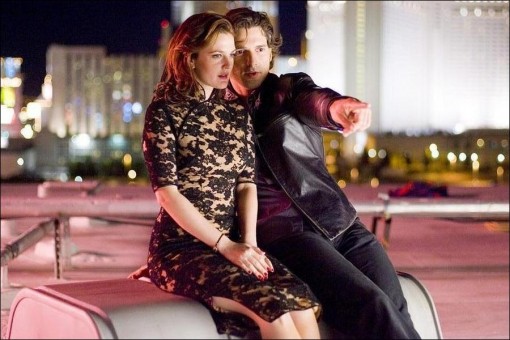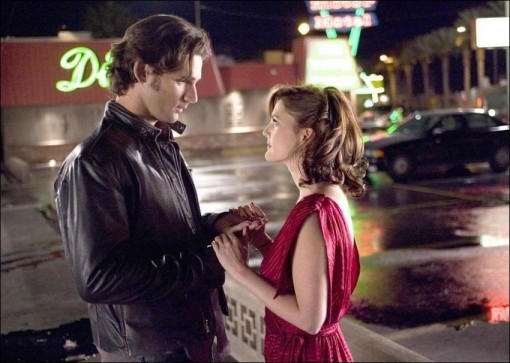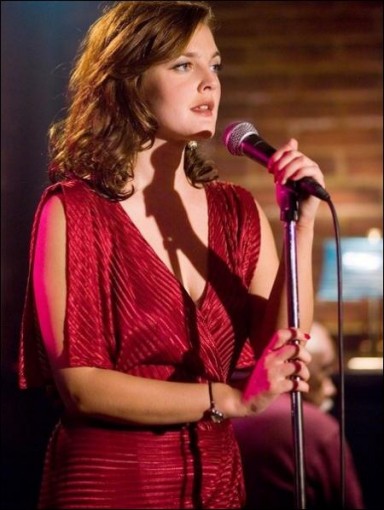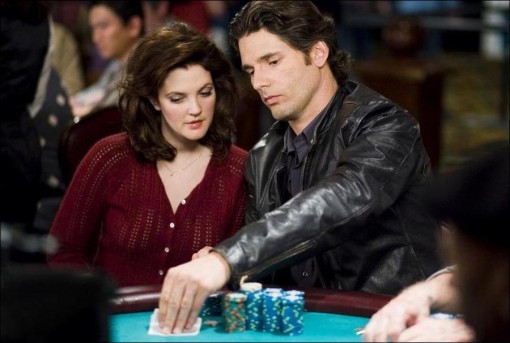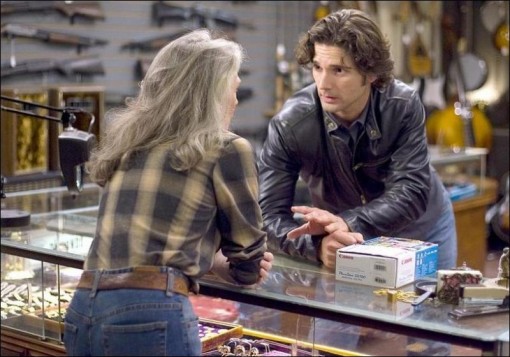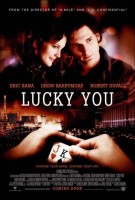Tagline: Change your game. Change your life.
A gifted poker player juggles an intense relationship with his girlfriend’s sister, while trying to raise the money to play in his field’s annual “World Series” — even if it means squaring off against his father.
Set in the world of high-stakes professional poker, the story focuses on Huck Cheever (Eric Bana), a gifted young poker player confronting his personal demons as he attempts to win a world championship tournament in Las Vegas.
In “Lucky You,” director Curtis Hanson brings us a story based in the world of high-stakes Las Vegas poker. Huck Cheever (Eric Bana) is a blaster—a player who goes all out, all the time. But in his personal relationships, Huck plays it tight, expertly avoiding emotional commitments and long-term expectations.
When Huck sets out to win the main event of the 2003 World Series of Poker—and the affections of Billie Offer (Drew Barrymore), a young singer from Bakersfield—there is one significant obstacle in his path: his father, L.C. Cheever (Robert Duvall), the poker legend who abandoned Huck’s mother years ago. As these two rivals progress toward a final showdown at the poker table, Huck learns that to win in the games of life and poker, he must try to play cards the way he has been living his life and live his life the way he has been playing cards.
Shuffle Up and Deal
“Lucky You,” the new romantic drama from writer/director/producer Curtis Hanson, is set in the world of high-stakes poker in Las Vegas in 2003. A longtime poker player himself, Hanson offers, “I wanted to do a relationship story set in the world of poker because I’ve always been fascinated by the fact that the skills one must develop to be a good poker player are almost the exact opposite of the skills needed to be successful in a relationship.
Deceit, or bluffing, which can destroy the trust needed for a successful personal relationship, is a big part of the game. There is also no collaborative spirit; it’s an individual sport. Poker players must be completely self-centered; they can’t have sympathy and win. They can’t worry about whether their opponent can afford a loss. By contrast, warm human relationships are based on caring, empathy, honesty and often putting the other person first. Because of this dichotomy, it seemed poker could be both a metaphor and a mirror for the different relationships in a story.”
Screenwriter Eric Roth actually began writing the original script for “Lucky You” before the spike in poker’s popularity. “I wanted to create something different about gamblers and gambling because I think all great gambling movies are love stories at heart, about winning and losing and finding your way,” he says.
Hanson adds, “We set the story in 2003 because that was the year the world of poker dramatically changed. Three things came together to make that happen. Internet poker was exploding, allowing amateur players from all over the world to hone their card skills online. The hole card camera was introduced that year, which made the game much more popular on television because it allowed the audience at home to see the players’ hole cards and learn about the nuances of betting and bluffing from the top pros. And it was the year an unknown amateur internet player named Chris Moneymaker won the World Series of Poker, making it possible for everyone to say, ‘That could be me.’”
Hanson and Roth collaborated on a final script even as the fast-growing poker craze was bringing a new dimension to the story of a dynamic young poker pro named Huck; his estranged father, legendary poker champion L.C. Cheever; and an aspiring singer named Billie, who comes into Huck’s life and becomes, at once, his muse and his conscience.
Producer Carol Fenelon remarks, “I think Curtis believes the ability to distinguish truth from artifice is an important element of any relationship. In many ways, the world of professional poker in Las Vegas provided the perfect opportunity to explore that idea. Poker can only truly be mastered by those who excel at discerning the difference between honesty and deception. The ability to read people—to understand their ‘tells’ and then act on that knowledge to one’s personal advantage—is perhaps the biggest key to conquering the game.”
Producer Denise Di Novi notes that the poker boom coming when it did was “a nice coincidence because more people are playing and watching poker and understanding the game. Poker really is used as a kind of metaphor for how the characters lead their lives and deal with their relationships, so the more people understand poker, the more meaningful that aspect of the story is to them and the more they can get out of the movie. It’s about the game of life and how you play it to get the most out of it. How much risk do you take and how much do you open up?”
Face Cards
Eric Bana was cast in the central role of audacious poker player Huck Cheever, and Curtis Hanson says that the actor came with an uncompromising approach to his work that made him perfect for the role. “Like Huck, Eric Bana is a blaster; he came at his part full out. During the rehearsal period, he not only worked on his scenes but immersed himself in learning the game of poker. He is a true chameleon. Unlike many actors who twist characters to fit their own personalities and characteristics, I think Eric looks at each part as an opportunity to truly become someone else.”
In becoming Huck Cheever, Bana says that he developed an insight into what drives his character. “I think Huck has competitive juices flying through his system so the world of poker really suits his personality and his lifestyle. He enjoys it; it gives him a sense of purpose, but he’s so immersed in that world that, really, nothing else exists for him. I think other people believe he could be one of the great poker players if he could keep his head together, but I’m not sure he knows himself what his true potential is. In a way, he was born to be a poker player, but he needs to sort out other elements in his life if he is going to take his game to the next level.”
Huck’s innate ability at the poker table and his seeming inability to reach his potential can both be traced back to one “element” in his life: his strained relationship with his father, L.C. Cheever, a maverick poker player in whose shadow Huck has always lived and played. “Huck is haunted by his father’s reputation in the poker world,” Bana comments. “We see his behavior change when L.C. is around. He’s a much more secure player when his father is not around and becomes a little hotheaded when L.C. is present. It definitely has an effect on him.”
In what the filmmakers agree was something of a casting coup, Academy Award winner Robert Duvall stars in the role of L.C. Cheever. “We wanted L.C. to be an almost iconic figure, so the choice of Robert Duvall to bring him to life was an easy one,” states Hanson. “He brought all of his creative power to the role, beautifully establishing the essence of the man—fiercely competitive, tough and intimidating, both as a father and as a player.”
Duvall is only half joking when he says that he didn’t know the difference between a flush and a straight when he was approached to play the role of a great poker champion. “I really didn’t know if I could do this part because there was so much to learn. But it was a very sophisticated script—very smart and very accurate—and Curtis is a talented director, so I thought it would be interesting. I wish I could have gotten the script six months earlier, though, because I almost had to decode it, but I did my research and now I understand the game…somewhat.”
Duvall, however, needed no help understanding the dynamic between L.C. and Huck, saying, “A lot of animosity has built up between them, especially on Huck’s part because of certain things that have happened in the past. But L.C. hasn’t given up on them at all; throughout the movie he tries to reach out to Huck.”
Denise Di Novi notes, “The father-son relationship was always important to the story, but once Robert Duvall was cast, it became even more meaningful because he’s such a brilliant actor and added so much dimension to it. To me, that aspect of the story is something every adult can relate to, because it’s about how you can’t really move on with your life and have a successful relationship until you deal with the baggage that you carry from your parents, which we all must do.”
Seeming to bear out that theory, Huck’s romantic entanglements have been limited to brief flirtations and casual affairs with no promise, or even hope, of any longterm commitments. However, all that seems about to change with the arrival of an aspiring young singer named Billie Offer.
Drew Barrymore, who stars as Billie, observes, “She is so different from the people in Vegas who are willing to risk it all. Billie is very much a person with traditional values who believes you have to work hard to make it. But she thinks Las Vegas is the place for her because it’s where she can finally try to do the thing her heart wants most, which is to sing. When I read the script, I immediately liked her honesty and her humility and the way she sees the world. She is idealistic but also very grounded, especially in a town that is way up in the clouds.”
Nevertheless, Barrymore admits that one aspect of the role gave her pause. “I had to sing in this movie, which terrified me, but Curtis asked me to train as hard as I could so it could be me up there singing. Just the fact that he had that kind of faith in me meant the world to me, so I told him I would do whatever it took.”
And she did, Hanson attests. “She worked very hard, and I just love her for that. Beyond that, Drew projects a unique combination of innocence and wisdom that I thought would be perfect for the role of Billie. Like Huck, Billie is especially adept at reading people, but instead of using what she learns to defeat them, she sees their emotional truth with an open and supportive heart.”
Perhaps a little too open when it comes to Huck, Barrymore acknowledges. “Billie has been very reliable and old-fashioned in a sense, but the thing she’s been the most frivolous with is her heart. She really intends to be careful from now on and try and the right person, someone who is not going to hurt her. Then, of course, she meets Huck, who is a classic heartbreaker. I think she might sense that, but because of the small-town world she comes from, she has a certain lack of judgment about him. But when he crosses the line, she will not be ‘bluffed’ or charmed like the other women in his life. She becomes an example to him of how to be honest and true to yourself, whether the stakes are small or high…whether they are personal or professional.”
“Huck sees something in Billie that he hasn’t seen before in other women,” Bana agrees. “I think that’s why he ultimately lowers his guard with her, which allows him to experience the first true relationship he’s probably ever known.”
Billie’s older sister, Suzanne, an old acquaintance of Huck’s, warns Billie not to succumb to Huck’s womanizing charms. But as Billie and Huck’s relationship progresses, Suzanne begins to let go of her concerns. Suzanne is played by Debra Messing, who affirms, “I think Suzanne sees that Billie has gotten to Huck, and there might actually be hope for something real for him. Curtis and I talked a lot about the differences between the two sisters. Billie is a romantic; she sees everything with hope and optimism, whereas Suzanne is a little more world-weary and a realist.”
Barrymore agrees. “I think Billie is definitely an optimist. She knows that heartbreak is inevitable in life—she’s experienced it before and may again. But she sees something in Huck that makes her willing to risk her heart again.”
The Reel Deal
“Lucky You” is the first Hollywood film to be set against the excitement and drama of the recent worldwide poker phenomenon, and the filmmakers went to great lengths to accurately represent the world of high-stakes cash games and tournament play in Las Vegas, circa 2003. For assistance, they turned first to poker legend Doyle “Texas Dolly” Brunson. In addition to serving as the film’s poker consultant, Brunson was in a position to have a special insight into the central characters of “Lucky You.” Like Robert Duvall’s character, L.C. Cheever, Brunson is a two-time World Series of Poker Champion and is considered an icon in the world of poker. And, like L.C., Brunson also has a son, Todd Brunson, who has followed in his father’s footsteps and will forever be faced with the legacy of his more-famous father.
Matt Savage, who has been a tournament director for some of the biggest events in poker, served as the film’s tournament consultant, and professional poker player Jason Lester, who finished fourth in the WSOP Main Event in 2003, acted as a consultant for the scenes involving the film’s climactic Main Event championship. Brunson, Savage and Lester also make cameo appearances in the movie.
The first order of business was to teach Bana and Duvall how to play poker like seasoned pros. “Robert Duvall and Eric Bana trained for months in order to play side-byside with the poker professionals who appear in the film. Their goal was not to become expert players, per se, but to be able to sit at the table and handle their cards and their chips like the experts,” explains Hanson. “Robert also had the privilege of spending a considerable amount of time with Doyle Brunson. And while his character is not based on Doyle, it was certainly informed by Robert’s experiences with him.”
While hanging out with Brunson, Duvall discovered that, in the poker world, the definition of a celebrity is quite different. “I went down with Doyle to the casino in Commerce, California, and almost nobody came up to me at all. I don’t even know if they recognized me. He was definitely the star when we walked in there.”
Eric Bana also benefited from time spent with some real-life poker pros, both on and off the set. “It lifted our game because it’s impossible for it not to rub off,” the actor says. “For instance, a scene that might only be a minute onscreen could take us days to shoot, so that’s hours and hours sitting around with these guys, and all you’re doing between takes is talking poker. It definitely elevated my ability to sell my character as someone who knows his way around a poker table.”
“With millions of people watching poker on television, it was vital to maintain the authenticity of not only the game but its players,” states Hanson. To that end, Brunson, Lester and Savage were joined onscreen by some of today’s most recognizable poker pros: Jack Binion, Johnny Chan, Hoyt Corkins, Antonio Esfandiari, Sam Farha, Chris Ferguson, Ted Forrest, Phil Hellmuth, Chau Giang, Barry Greenstein, Dan Harrington, Karina Jett, John Juanda, Erick Lindgren, Minh Ly, Mike Matusow, Daniel Negreanu, Erik Seidel, Mimi Tran, Cyndy Violette, Marsha Waggoner and Robert Williamson III.
“It was very important that we surround the actors with people who really know how to play the game, how to handle their chips, and how to bet,” Hanson asserts. “To me, that was more important than having people who could just deliver the lines. Poker is very much a game of looks and attitude.”
In fact, apart from Eric Bana and Robert Duvall, one of the only Hollywood actors with a major role at the poker table is Emmy winner Jean Smart in the role of Michelle Lewis. Smart’s character was inspired by one of poker’s most successful female professionals, Jennifer Harman, while Harman herself appears in the film as a fictional player named Shannon Kincaid. Poker pros John Hennigan and David Oppenheim also portray fictional characters in the movie.
Sam Farha comments that the pros were impressed with the director’s commitment to accuracy. “He would ask us, ‘Is that how you’d play it? Is this how the betting would go?’ He wanted us to give our opinions. I think he did a great job.”
Hanson valued the guidance of all the players, but none more so than Doyle Brunson. “We wanted the poker in the movie to be valid, so we based every hand of cards on a real hand, either from tournament play or an observed cash game,” the director offers. “We were lucky enough to enlist Doyle early on as our poker consultant. I went over every hand with him—the sequence of the cards and the betting—taking his advice and making adjustments. Doyle, of course, knows better than anyone that there are no hard and fast rules of play: players make unpredictable moves and luck is definitely part of the game. That’s why poker is endlessly fascinating.”
Throughout the production, the presence of the real poker players was invaluable to the filmmakers, who went to great lengths to accurately represent not only the world of tournament play but the less public high-stakes cash games in Las Vegas. No detail was overlooked; even the dealers at the tables were all longtime poker dealers who were recruited for the film from local casinos during filming in Las Vegas.
The numerous poker scenes in the film are not restricted to the No Limit Hold ‘Em tournaments with which television audiences are very familiar. They encompass both cash games and tournament play and include a mix of different poker games with varying levels of stakes. At the Bellagio, we see Huck “playing with the guppies” to build up his bankroll before he eventually moves up to the “Big Game,” where he plays with the game’s top pros.
Carol Fenelon remarks, “Most outsiders don’t know about the Big Game, but it is legendary in Las Vegas, and we went to some trouble to create a fictional but authentic version of it in the film. The ‘Big Game’ is a mixed game where the type of poker being played changes every half hour or so, unlike regular casino tables where one particular version of poker is played continuously. It is the pantheon of cash games where the biggest action and the best players are. The ‘Big Game’ is where Huck’s father plays whenever he’s in town, and Huck wants to prove he can compete at that level and win.”
“There’s a big difference between tournament play and the high-stakes games,” Jason Lester explains, adding that there is also a difference between playing and filming a poker tournament. “A poker tournament can go ten hours or more a day, but we play different hands. We don’t play the same hand for ten hours over and over,” he laughs.
“Filming the poker scenes was a challenge,” says Hanson, who teamed with cinematographer Peter Deming to capture all the action. “How do you film them in a way that makes it interesting? How do you differentiate one game dramatically from another? How do you make it special for audiences who are now used to watching poker on television? On television, the pocket camera allows the viewer to see the hole cards of all the players. Being ahead of the players is entertaining, but, of course, it’s not what playing the game is actually like. Additionally, when telling a story, I want the audience to identify with one character as much as possible. Consequently, we shot all the poker scenes from Huck’s point of view; we see only his hole cards and we watch him trying to figure out what the other players have. This invites the audience to think along with Huck and will hopefully help them to identify with him, too.”
To anyone who watches poker, the seemingly unconscious habit of shuffling stacks of chips is a definite indicator of long hours spent honing one’s skill in live games. It seemed appropriate to Bana and the filmmakers that Huck would have such a tic. While on location in Las Vegas, Bana, Hanson and Fenelon spent an afternoon at the home of one of the game’s best chip handlers, Antonio Esfandiari. Esfandiari taught Bana a three-chip hand manipulation that the actor can be seen using throughout the movie.
Apart from cards and chips, the role of Huck Cheever required that Bana also master a completely different skill set. “Eric not only had to learn to play poker, he also had to train to hit a golf ball like a player with a four handicap,” Hanson offers, referring to a pivotal sequence in which Huck is forced to take on a physically demanding bet. “He did that very well, too. Every golf shot in the movie is his.”
But only after hours spent on the links of Australia, Los Angeles and Las Vegas, Bana concedes. “For me, the golf was the most daunting part of the making the film, because I’d played very, very little golf, and my game had usually been of great comedic value to my friends. You could have nicknamed me ‘The Slicer.’ But Curtis was very strict about it. He said, ‘You have to swing like you have a four handicap, so get to work.’ So I did, and it really paid off. I don’t know how many free golf lessons I had, but it was a lot,” he smiles.
The golfing scene in “Lucky You” is no ordinary game; it is part of an elaborate “proposition bet” conceived by an inveterate gambler named Ready Eddie, who is played by popular comic actor Horatio Sanz. Eddie gambles that Huck can’t run five miles and shoot 18 holes of golf in 78 strokes or under, all in three hours or less. If he can do it, Huck will win the $10,000 he needs to stake his entry into the World Series of Poker. If not, he’ll be another $10,000 in the hole.
Barrymore offers, “I think that’s a great sequence in the film because Billie—seduced by the excitement of the competition—finds herself rooting for Huck. But then his willingness to do anything to win causes her to distrust him once again.”
In the film, Ready Eddie is also engaged in an even more outlandish wager with a character named Lester, played by Saverio Guerra. Eddie bets Lester that he can’t live for one entire month in the men’s room at the Aladdin Hotel. What might seem even more peculiar than a guy having room service delivered to his lounge chair set up in a hotel men’s room is that the same guy appears to have a decidedly female bustline—the result of yet another unconventional bet.
If moviegoers assume the outrageous bets portrayed in “Lucky You” are merely the invention of the screenwriters, they would be in for a surprise. In fact, side bets— both impromptu and planned—are fairly commonplace among gamblers who call Las Vegas home.
Surrounded by poker pros and gamblers during filming, Eric Bana witnessed firsthand that anything could spark a vigorous round of betting. “We were sitting at a poker table with these guys for weeks on end and they’re just betting on everything,” he laughs. “They’d bet on how many takes we would do for that set-up, or how many times the camera would have to move for that scene…anything to get their juices flowing.”
The Perfect Bluff
The filmmakers’ dedication to verisimilitude was carried over into every aspect of the production, including the spot-on re-creation of the poker room at the Bellagio Hotel and Casino, which had been completely redecorated since 2003 when the story takes place.
The initial intention had been to shoot in the actual poker rooms, but the Bellagio’s renovation made that impossible. Instead, the decision was made to build an exact replica of the Bellagio poker room, circa 2003, on a soundstage in Los Angeles. As it turned out, the timing of the Bellagio refurbishment could not have been more serendipitous. Production designer Clay A. Griffith reveals, “The hotel was auctioning off all the old murals, carpeting and furniture, so we just outbid everyone. The chandeliers, the drapes, the sconces—we got it all, which was fantastic because it was a very intricate set to build; there is so much latticework and detail, even on the ceiling. The Bellagio was also very cooperative. They even supplied copies of the original floor plans.”
The result was an uncanny re-creation of the Bellagio’s original poker room, as those who knew best testify. “It blew me away,” says poker professional Daniel Negreanu. “It was surreal; it was the exact same Bellagio poker room that I remember. There was nothing at all different about it.”
Fellow pro Erick Lindgren agrees. “I was almost scared when I walked in and saw the Bellagio set. It was like traveling back in time.”
The pros had a similar reaction to Griffith’s duplication of the famous “Benny’s Bullpen,” the upstairs multi-purpose room at Binion’s Gambling Hall, where the final table of the WSOP Main Event was played in 2003. Matt Savage recalls, “I got chills walking into that room in L.A. and seeing how realistic it looked. They did an amazing job.”
Griffith and his team could take particular pride in the observations of the one man whose opinion arguably mattered most: Jack Binion. “I couldn’t believe the attention to detail to make everything so accurate,” he remarks. “It was just great.”
Remembering the humble beginnings of what is now the WSOP, Binion says no one could have predicted that Hollywood would someday come calling. “We weren’t even thinking of it as a poker tournament; it was more of a poker ‘get together.’ We started out with maybe 50 or 60 people, and it came down to a kind of consensus of opinion of who was the best poker player there. We never dreamed it would become this popular. I think the two things that really made the change were the hole card cam and the internet poker sites. It’s just exploded, especially in the last few years.”
Hanson verifies, “There were 631 players in the 2002 World Series of Poker. By 2006, that number had mushroomed to more than 8,000. Veteran players now find themselves going up against players who cut their teeth staring at avatars on a screen. I think that’s part of the enormous appeal of the game today. Unless you’re deluded, you don’t really think you could go one-on-one with Allen Iverson on the basketball court or compete against Tiger Woods on the golf course. But in poker, you can play against the best, and, with a little luck, you can even win.”
Apart from the replication of the Bellagio poker room and Benny’s Bullpen, most of the principal photography on “Lucky You” was accomplished on location in Las Vegas, where, Denise Di Novi says, “Curtis wanted to show the Las Vegas that we haven’t often seen on film—not the glitzy Vegas, but the diners and the shops and the neighborhoods where the people that live and work there hang out. Las Vegas exists in two parallel worlds: the modern tourist attraction Vegas and the old historic Vegas, which is more authentic.”
Griffith confirms, “We wanted to show Las Vegas from different points of view, to combine classic and contemporary settings in terms of what was left of the old Vegas versus the new Vegas, where things are changing by the minute. That actually made scouting a challenge. There were places I found in November—like little restaurants that had been around since the ‘50s—that were suddenly gone when I went back in January.”
“Sadly, I think Las Vegas is the quintessential example of our culture’s failure to value what is authentic and historic and to instead favor a newer simulated version of the original,” Fenelon comments. “Places that reflect the period in which they were built are being torn down everywhere in our country, but Las Vegas is perhaps the most extreme example of it. The Strip is an amalgamation of architectural make-believe.”
Filming in Las Vegas also took place at the Aladdin Casino, the Polo Lounge, and in the actual poker pit at Binion’s, as well as at the Bear’s Best Golf Course, designed by the great Jack Nicholas, where each hole is a replica of a hole that exists on another famous golf course. Going behind the scenes at the Bellagio, Hanson shot Huck’s arrival on a motorcycle in a work area underneath the casino that is off-limits to tourists and then followed him through a labyrinth of corridors and hidden stairways to a door where he literally pops out next to the stage of the popular Fontana Lounge on the casino floor.
Hanson notes, “One of the things I love is having the opportunity to go into a world other than my own—submerging myself in that world, learning as much as I can about it and then selectively using what I’ve learnt in the telling of a story. That was very much the case with the world of high-stakes, professional poker portrayed in ‘Lucky You.’ The balancing act, if you will, was to try and show it in such a way that the people who really know it would feel it was a true representation of their world, and at the same time, to tell a story that’s entertaining and maybe even enlightening to the rest of the audience.”
No Bad Beats
For the filmmakers, music was another integral element in capturing the time, place and emotions of the story. Fenelon relates, “One of the first things we think about is the music. How can we use it to reveal the essence of the characters, the settings and the themes? Coming into ‘Lucky You,’ Curtis and I both gravitated—independent of one another—toward the Americana music of artists like Bob Dylan, Bruce Springsteen, Ryan Adams and George Jones.”
Legendary music pioneer Bob Dylan had previously worked with Hanson and Fenelon on the film “Wonder Boys,” writing the song “Things Have Changed,” which brought the artist an Academy Award and a Golden Globe Award for Best Original Song. The filmmakers were thrilled when Dylan offered to compose a new song for “Lucky You.” The result was “Huck’s Tune,” which Fenelon calls “the most mesmerizing contribution to the film’s soundtrack. It is a perfect poetic rendition of the movie that cuts to the essence of both Huck and the film.”
Other songs heard in “Lucky You” include: “Lucky Town” and “The Fever” (Bruce Springsteen); “Like a Rolling Stone” (Bob Dylan); “Let It Ride” (Ryan Adams); “El Paso” (Marty Robbins); a cover of Leonard Cohen’s “Dance Me To The End of Love” (performed on camera in the Fontana Lounge at the Bellagio by Madeleine Peyroux); “Choices” and “I Always Get Lucky With You” (George Jones); a Kris Kristofferson cover of “They Ain’t Got Em All” (also performed on camera by Drew Barrymore); and Drew Barrymore’s cover of the George Jones classic “Cold Hard Truth.”
“All of these songs are steeped in emotional truth, honestly and openly presented,” Fenelon says. “They reveal the pain and frustration of love and life and growing old, of making the wrong choices, of taking risks and losing and trying again.”
Production notes provided by Warner Bros. Pictures
Lucky You
Starring: Eric Bana, Drew Barrymore, Robert Duvall, Debra Messing, Phyllis Sommerville, Robert Downey Jr
Directed by: Curtis Hanson
Screenplay by: Curtis Hanson, Eric Roth
Release Date: May 4th, 2007
MPAA Rating: PG-13 for some language and sexual humor.
Studio: Warner Bros. Pictures
Box Office Totals
Domestic: $5,758,950 (68.7%)
Foreign: $2,623,527 (31.3%)
Total: $8,382,477 (Worldwide)
